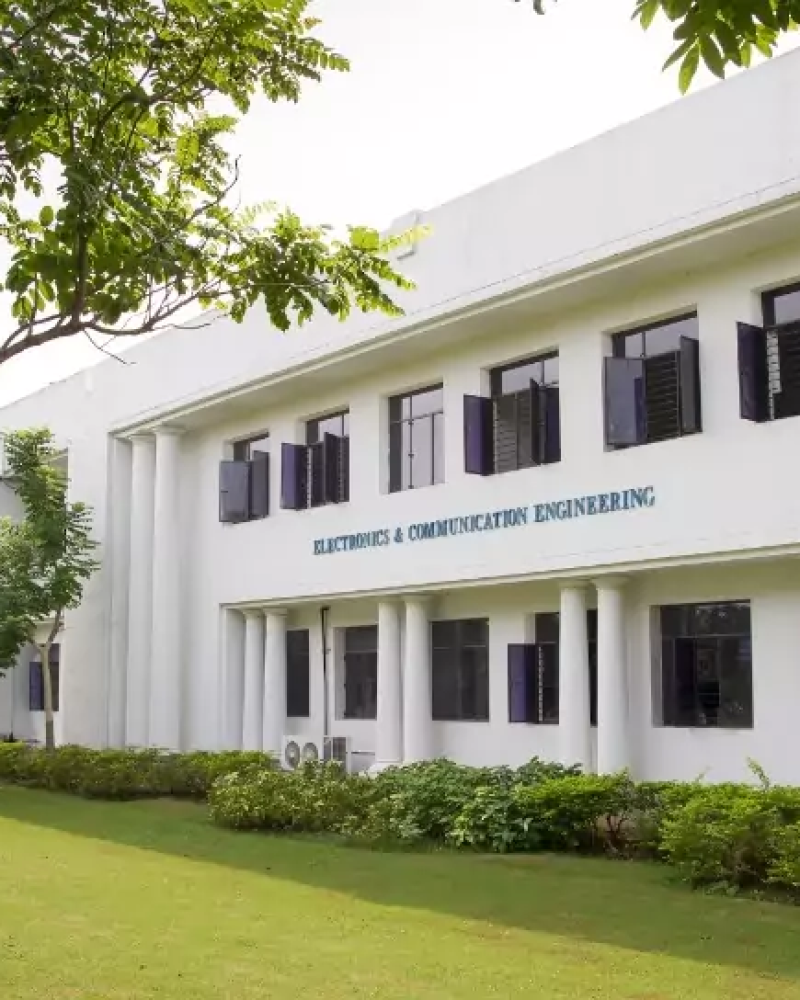- B.E. (ECE) Department Profile
- B.E. (ECE) Programs Offered
- B.E. (ECE) Key Program Elements
- M.E.(Communication Systems) Department Profile
- M.E.(Communication Systems) Key Program Elements
- M.E.(VLSI Design) Department Profile
- M.E.(VLSI Design) Key Program Elements
- Ph.D. / M. S (by Research)
- Research
- Faculty
- Newsletter
- Events
- Events @ M.E. Communication Systems
- Contact
B.E. in Electronics and Communication Engineering at SSN
Exciting Career and Higher Education Opportunities for ECE Graduates at SSN
The Department of Electronics and Communication Engineering (ECE) at SSN offers diverse career opportunities for its graduates in core engineering, software, public sector and research. Alumni have been placed in top core companies such as Robert Bosch, Qualcomm, Aricent Group, Comcast, Tata Elxsi and Soliton, as well as leading software firms like Thoughtworks, Infosys, Cognizant, HCL, TCS and IGate.
Many ECE students pursue higher education in prestigious global universities, including Stanford, Georgia Tech, Cornell, University of Texas and North Carolina State University. Additionally, graduates have secured roles in public sector units (PSUs) such as BSNL, NTPC, DRDO, ISRO, BHEL, BEL and IGCAR.
The department has active collaborations with Brigham Young University (USA), University of Catania (Italy) and Griffith University (Australia), providing students with global exposure. Moreover, MOUs with leading corporates like TATA Elxsi, Alcatel Lucent, BIGCAT Wireless, FORD and Valeo support internships, placements and industry-driven projects, ensuring students are well-prepared for future challenges.
Innovative Teaching and Learning at SSN’s ECE Department
The Department of Electronics and Communication Engineering (ECE) at SSN employs innovative teaching methodologies to enhance the learning experience. Faculty members provide internet-based access to learning materials via the Learning Management System (LMS), ensuring students can access resources anytime, anywhere.
To bridge theory with practice, integrated lab components are included within theory courses, fostering hands-on learning. The institution also supports student innovation by providing seed funding for minor projects. Additionally, active learning methods such as quizzes, mini-projects and indirect assessments strengthen conceptual understanding.
For high-achieving students, the department offers an Honors degree in the Internet of Things (IoT), with a specialised focus on embedded system technologies, preparing them for cutting-edge advancements in the industry.
Highlights of B.E. - Electronics and Communication Engineering

Seminars by faculty members, research scholars, alums, and external eminent personalities for technology and career guidance.
Inplant training and Industrial Internships with stipends for students through MoUs(Tata Elxsi, SETS, SAMEER & INSA to name a few).
Support for attending summer schools organized by premier research and academic organizations in India.
Opportunities for International internship in the US, Canada and Europe.
Highlights of B.E. - Electronics and Communication Engineering
The Department’s annual conference WISPNET technically co-sponsored by IEEE which hosts keynote addresses from eminent researchers and academicians across the globe.
The Department organizes a National level conference (NCICT) every year, where delegates from various academic and industrial organizations participate to share their experience in the field of electronics and telecommunications.
TechClub – A student-run forum where senior students help junior students with various cutting-edge technologies such as robotics, IoT, VLSI, etc.
Periodic reviews by industry / academic reviewers for student academic and internally funded research projects.
SSN Research Day – incentives/awards for best faculty researchers.
SSN Doctorate Scholar Day – incentives/awards for best research carried out by research scholars.
SSN Undergraduate Researchers Day – awards for best student researchers to inculcate research spirit in the young minds.
Enterpreneurship-cell activities such as SYCON, Teach a School, etc.
Incubation & Innovation Centre.
Curriculum Overview

24 Professional Core Subjects

24 Professional Elective Subjects

30 Professional Core Subjects

30 Professional Elective Subjects

3 Employability Enhancement Course

6 Humanities and Social Sciences Subjects

2 Employability Enhancement Courses

8 Open Elective Subjects

17 Basics and Engineering Sciences Subjects

2 Mandatory Courses.







